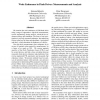Free Online Productivity Tools
i2Speak
i2Symbol
i2OCR
iTex2Img
iWeb2Print
iWeb2Shot
i2Type
iPdf2Split
iPdf2Merge
i2Bopomofo
i2Arabic
i2Style
i2Image
i2PDF
iLatex2Rtf
Sci2ools
143
click to vote
FAST
2010
2010
Write Endurance in Flash Drives: Measurements and Analysis
We examine the write endurance of USB flash drives using a range of approaches: chip-level measurements, reverse engineering, timing analysis, whole-device endurance testing, and simulation. The focus of our investigation is not only measured endurance, but underlying factors at the level of chips and algorithms--both typical and ideal--which determine the endurance of a device. Our chip-level measurements show endurance far in excess of nominal values quoted by manufacturers, by a factor of as much as 100. We reverse engineer specifics of the Flash Translation Layers (FTLs) used by several devices, and find a close correlation between measured whole-device endurance and predictions from reverse-engineered FTL parameters and measured chip endurance values. We present methods based on analysis of operation latency which provide a non-intrusive mechanism for determining FTL parameters. Finally we present Monte Carlo simulation results giving numerical bounds on endurance achievable by a...
FAST 2010 | Operating System | Whole-device Endurance | Whole-device Endurance Testing | Write Endurance |
Related Content
| Added | 02 Oct 2010 |
| Updated | 02 Oct 2010 |
| Type | Conference |
| Year | 2010 |
| Where | FAST |
| Authors | Simona Boboila, Peter Desnoyers |
Comments (0)

